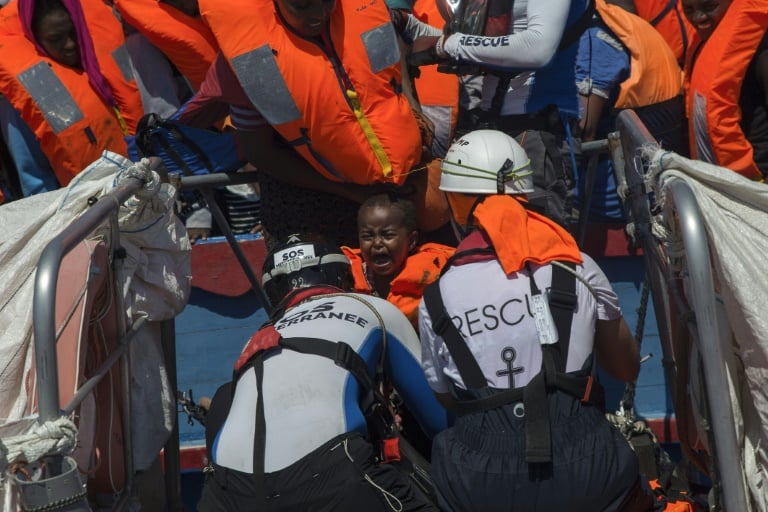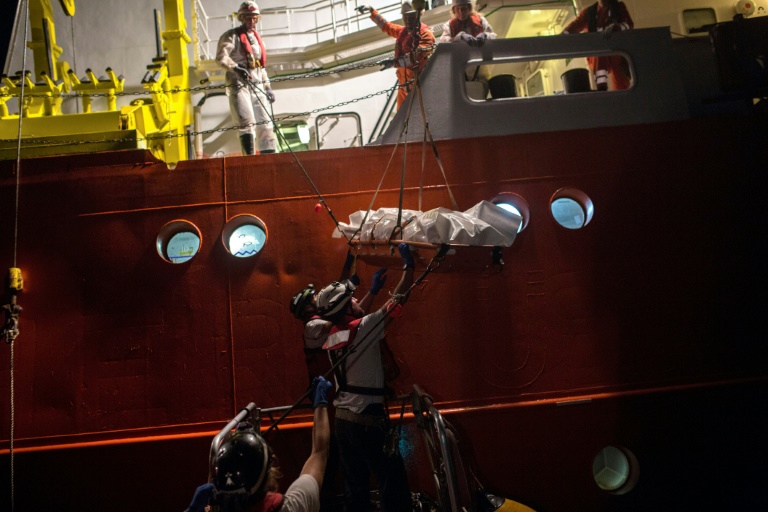Champions Cup result: Ill-disciplined Stormers thrashed by Harlequins
Libya’s navy last week ordered foreign vessels to stay out of a coastal “search and rescue zone” for migrants headed for Europe, a measure aimed at nongovernmental organisations it accuses of facilitating traffickers in illegal migration.
One by one the NGOs halted operations, except the Aquarius. The 68-metre orange boat, formerly used by the German coastguard, sailed alone off the Libyan coast on Sunday.
“For the moment, we are continuing our patrol operation in international waters,” said Nicola Stall, search and rescue coordinator for the Aquarius, which is operated by SOS Mediterranee and Doctors Without Borders (MSF).
And so the Aquarius team of rescuers keeps up its two-hour rotation, day and night, to watch for migrants floating on overcrowded and unseaworthy boats.
MSF workers meanwhile check their stocks of medications, while other volunteers give the bridge a fresh coat of paint.
As they wait, they are concerned about the calm sea and the favourable winds of the past few days. Despite such weather conditions, they haven’t seen a migrant boat for a week now.
“It’s very hard to know what is going on in Libya,” says Marcella Kraay, the MSF chief on board. Even during the bad weather in winter, they have never gone more than three weeks without rescuing hundreds of migrants.
“What we’re seeing at sea is that it seems fewer small boats are leaving Libya, and those that do leave are intercepted by the Libyan coastguards,” she says, adding that they were trying to get Libya to clarify the zone that foreign ships are barred from.
The Aquarius may be joined by vessels from the Spanish charity Proactiva Open Arms, which was expected to resume operations on Monday.
– Warning shots –
Last week Libyan coastguards frightened off most NGO rescue ships when they fired shots in the air opposite one vessel, warning that they would target it directly the next time.
The Aquarius has an emergency plan so everyone on board can lock themselves in should the ship be boarded.

A migrant child is rescued by members of the Aquarius rescue ship, operated by about a dozen volunteers from Europe, the United States and Australia
There are about a dozen people from the two NGOs, from several European countries as well as the United States and Australia.
Sailors volunteer their time to SOS Mediterranee while the MSF team includes doctors as well as logistical and technical people, veterans of humanitarian crises such as the Ebola epidemic and the Iraqi battle at Mosul.
The ship’s captain hails from Belarus and the roughly 10 crew members are mostly Slavs, hired with the boat but having chosen to take part in this rescue mission, which has been going on since last year.
At night the Aquarius keeps about 30 miles from the Libyan coast, mainly to avoid fishermen’s nets. During the day it moves closer so the coastline is visible, but stays about 24 miles away unless the Italian coastguard calls on them to help with rescues nearer shore.
Six years since a revolution that toppled longtime dictator Moamer Kadhafi, Libya has become a key departure point for migrants risking their lives to cross the Mediterranean to Europe.
– ‘Grave concern’ –

The Aquarius rescue ship run by SOS Mediterranee and Doctors Without Borders (MSF) prepares to load a body bag of a migrant who died at sea
Italy, which has borne the brunt of the migrant influx from north Africa, has welcomed Libya’s decision to bar NGO ships and invest more in its coastguard.
The number of migrants reaching Italy is down compared with last year. So far in August authorities say there have been 1,700 arrivals, far from the 21,300 recorded for the entire month in 2016.
But for humanitarian groups, what happens to migrants returned to or kept in camps in Libya is even more worrying.
“Fewer ships in the area will mean more people will drown at sea. And those taken back by the Libyan coastguards will be kept in captivity, and again exposed to violence, abuse, maltreatment, exortion,” says MSF’s Kraay. “This is really a grave concern.”
Download our app and read this and other great stories on the move. Available for Android and iOS.